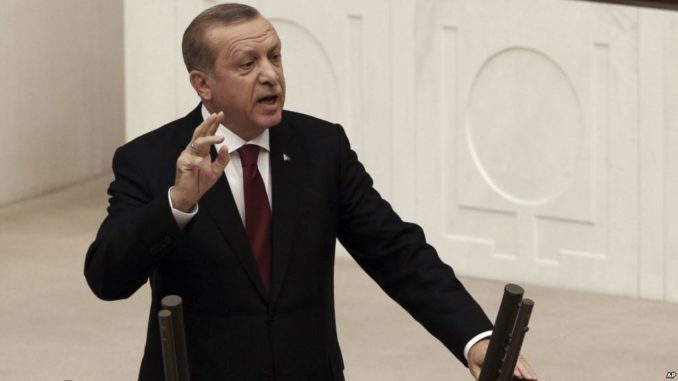
By Daren Butler
ISTANBUL (Reuters) – President Tayyip Erdogan warned on Friday that Turkey could open its gates for migrants to Europe if pushed into a corner by the European Union, a day after European lawmakers voted for a temporary halt to EU membership talks with Ankara.
Members of the European Parliament voted for a non-binding motion on Thursday urging the European Commission and national governments to institute what they acknowledge would be a largely symbolic freeze in negotiations because of Turkey’s “disproportionate” reaction to July’s failed coup.
Brussels has been treading a delicate line with Turkey. Despite its increased concerns over human rights and press freedoms, it needs Turkish cooperation to keep down the number of refugees and migrants reaching Europe from its shores.
“If you go any further, these border gates will be opened. Neither me nor my people will be affected by these empty threats,” Erdogan told a congress on womens’ justice in Istanbul, in reaction to Thursday’s vote.
“It wouldn’t matter if all of you approved the (European parliament) vote,” he said, in comments broadcast live.
More than 1.3 million people arrived in Europe last year, triggering bitter disputes between EU member states over how to handle them. The migrant deal with Turkey, though criticised by rights groups, has reduced the influx via Turkey to a trickle.
Turkey says it is home to the world’s largest refugee population, housing some 2.7 million Syrians and 300,000 Iraqis.
EU governments are unlikely to take heed of the European Parliament vote. Austria has led calls to stop Turkey’s membership talks but Germany, France and most other EU states for now back continued engagement and fear putting at risk Erdogan’s collaboration on migration.
Erdogan also said a controversial ruling party proposal that could allow men accused of sexual abuse to avoid sentence, which was withdrawn for review this week, had not prepared carefully, and believed that the issue would be brought back to parliament with a wider consensus.
The proposal would have allowed sentencing to be indefinitely postponed in cases of sexual abuse committed “without force, threat or deception” before Nov. 16, 2016, if the perpetrator married the victim.
The government said the bill was meant to remedy the situation of men sent to jail after they married girls under the age of 18, in religious ceremonies and with family consent. It rejected suggestions the plan amounted to an “amnesty for rape”.
(Writing by Nick Tattersall; Editing by Humeyra Pamuk and David Dolan)











